How the line producers can benefit from Filmustage software
Everything you need to know about the line producer profession.

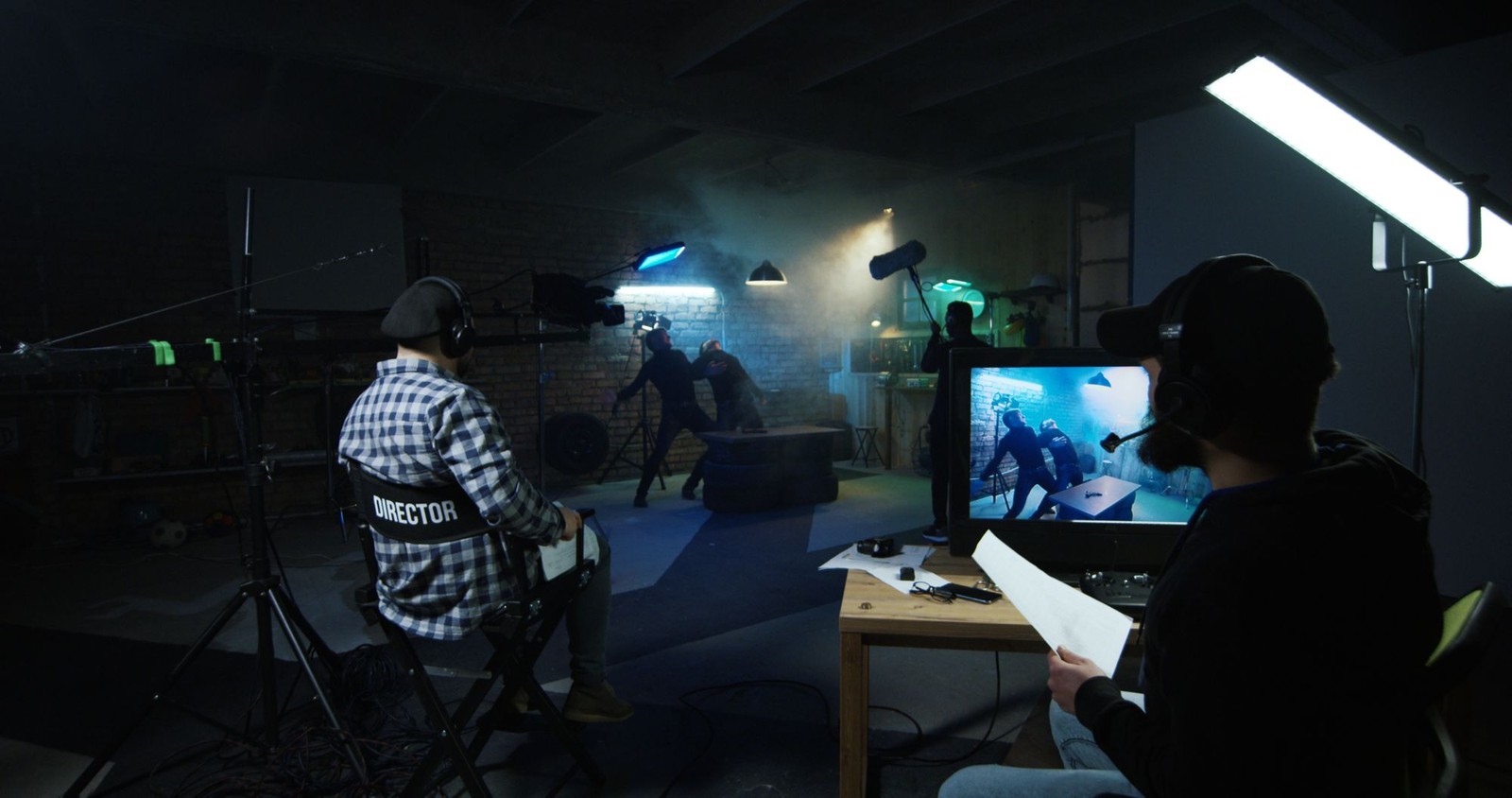
Line producers represent an extremely important, but hidden from the view area of activity in filmmaking. Viewers often pay attention to such roles and faces of the film like actors, directors, cinematographers, producers, as well as screenwriters, they become heroes of the press and their names are much more discussed by gossip. Therefore, it is not surprising at all that most of the key positions of cinematography turn into hidden figures, who nevertheless play a key role in the success of a project.
It is worth wondering how much the processes of film production will change if we remove such an element as a line producer from the formula? We are ahead of you and say that the debt-built structure of the industry risks collapse in a moment because the contribution of the line producer cannot be overestimated. Today the Filmustage team is going to explain what role a line producer plays and how our AI-powered platform can help them in their hard work.
So what is a line producer and what is the area of expertise in this profession?
The essence of this position in the film industry can be defined by three keywords: management, budgeting, and logistics. This tells us that line producer is a role that arises in the earliest stages of film production.
Management. The line producer is responsible for hiring some key roles such as production manager, production coordinator, production assistant, casting director, 1st AD, etc. Accordingly, the people in the positions we cited above report directly to the line producer. It is worth saying that, the line producer mediates between actors, directors, writers and make-up artists, location scouts, etc. You might think that line producer is almost the leading position in film production, but the hierarchical chain does not close on it. The fact that the line producer is hired by the executive producer and the producer, to whom the first is responsible.
When resorting to such key values as budgeting and logistics, inevitably there is a question of scrupulous work with the script - and we have repeatedly emphasized that the competent planning of the filming process, both in terms of time and money, requires an accurate script breakdown. Surprisingly enough, the budgeting process of a project on the part of the line producer is closely related to the script breakdown. Taking into account other responsibilities of a line producer in the field of management, it is hard to think how much effort and time is spent on scrupulous manual script breakdown, which remains still an industry standard. Page after page, the line producer has to manually tag different categories, which may take at times weeks.
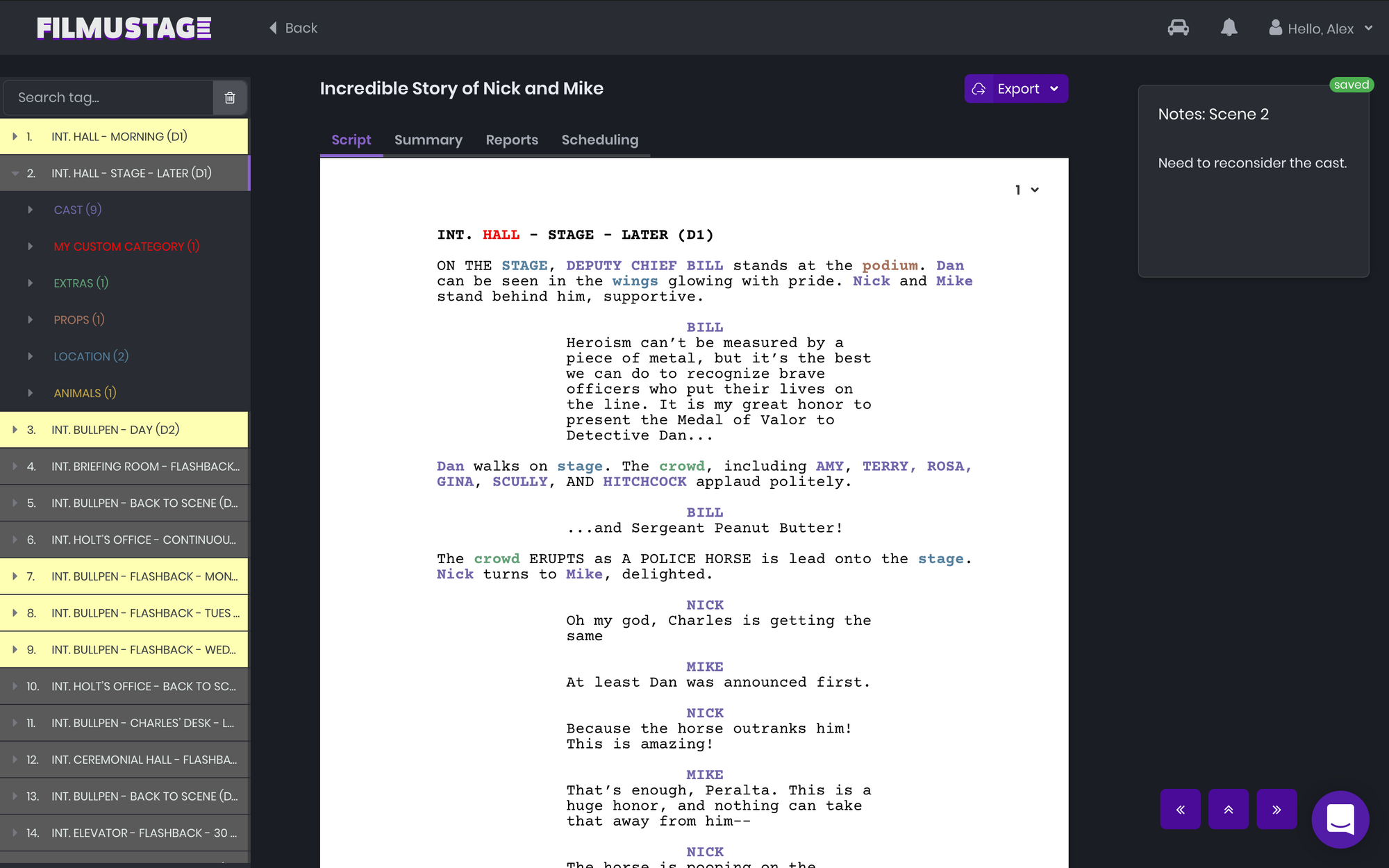
And by the wicked irony of life, the two main resources of every line producer - time and money - are also the main stumbling blocks. The difficulty of this profession is not in negotiating with different people and filling out a lot of paperwork (although not without that), but in the fact that producers literally have to find ways to cram film production into real life. Stopping traffic on a particular street isn't a problem, exactly until you come to the realization that you need to keep people waiting, who may be late for real work, while your team creates artificial reality in film.
Knowing your time and budget, a cool line producer is able to squeeze the most out of every scene or frame. So what does this mean? Mainly, it boils down to a simple, but not happy, axiom: anything that can go wrong is bound to go wrong. Unfortunately, there is no such thing as a perfect shoot, and you have to accept that, no matter how long you work on the stage. So if you want to work in the field of cinematography as a line producer, you need to be able to save money where it seems impossible to do so and vice versa.

So now let's try to articulate the main challenges that a line producer faces:
- Time and money. Here it's all clear: as much as these resources help us, they can also ruin our lives. Fair enough.
- Budget. You have to know everything about how to make budgets. You have to feel it in your heart, check and revise it.
- Scheduling. It is the scheduling stage that allows you to bring together the two major resources of filmmaking - time and money. However, on the other hand, poor planning can lead to the collapse of filming and cause great damage to production in terms of money and time.
- Other managerial problems. For example, I want to share with you a quote from the 'Top 10 Line Producer Tips That Will Keep You Under Budget' that also attributes location work to the responsibilities of a line producer: "Locations SHOULD get their own department. But that doesn't mean they will". This phrase speaks for itself: sometimes the producer deals with certain responsibilities, but sometimes with everything. Among other things, the line producer is engaged in paperwork, hiring below-the-line crew, arranging equipment and insurance for it, and much more.
Thus, it turns out that the line producer is a multitasking and extremely important position for the film industry, which, in addition, is characterized by many challenges and difficulties. However, in our opinion, the biggest pain for producers is time. And according to the clichéd saying: time is money. Obviously, time is a major factor and it's worth finding a way to make established production processes even faster. But how do we do that? You know, there's a company that created an automated breakdown service that really wants to revolutionize the way the industry thinks about pre-production. It's called Filmustage!
Okay, we understand that talking about ourselves in the third person is weird, but at least it’s funny. Now back to business. First and foremost, our platform saves you time and is extremely user-friendly. Literally, a few minutes after uploading your script you'll get a script that is completely broken down into multiple elements you need for shooting. Furthermore, as we are not intended to substitute humans' role in the film production process the platform functionality will allow you to customize and edit your tags in various ways to achieve the goals YOU want. Filmustage's pre-trained AI is here to save you days on simple tasks leaving more space for creativity.
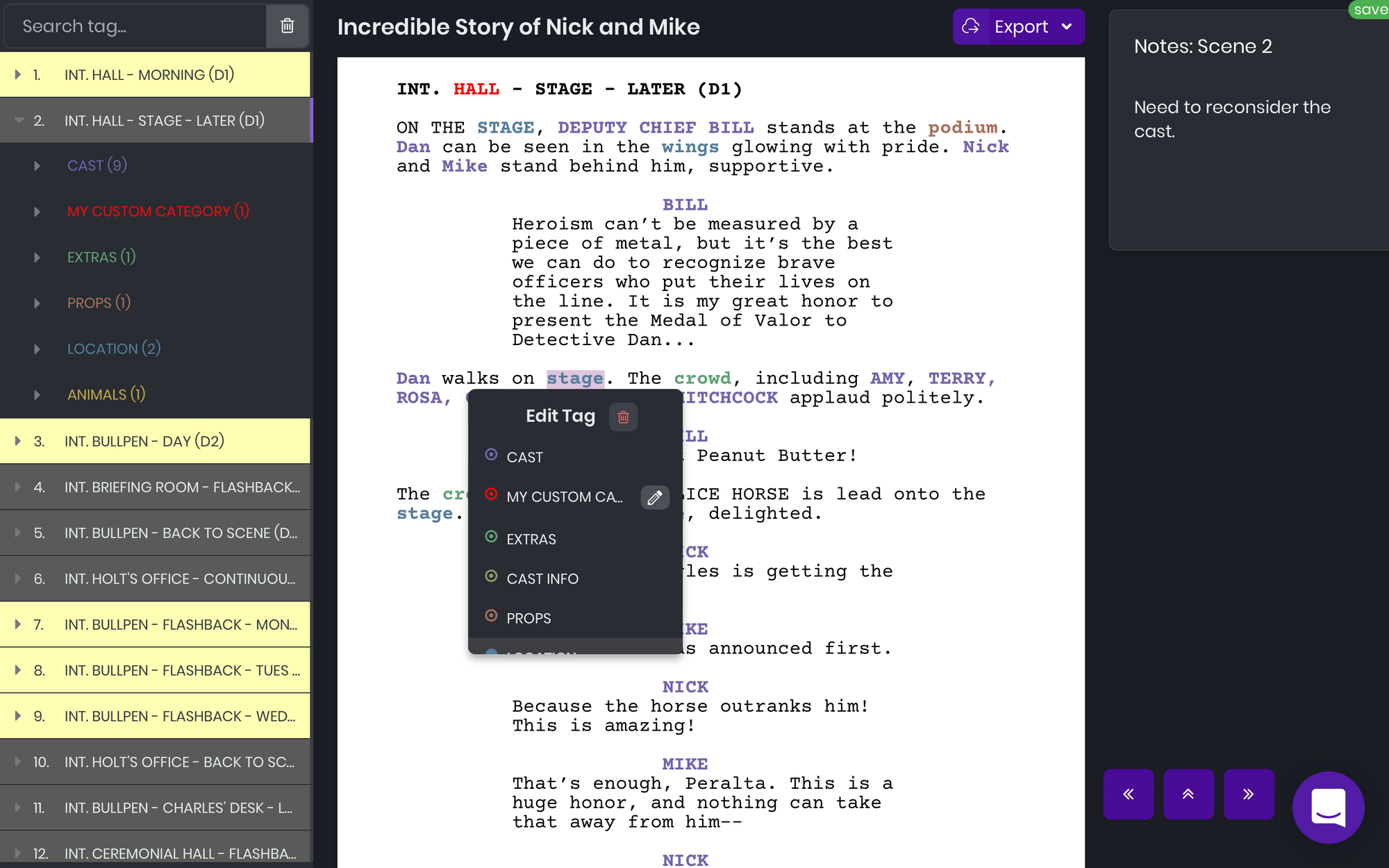
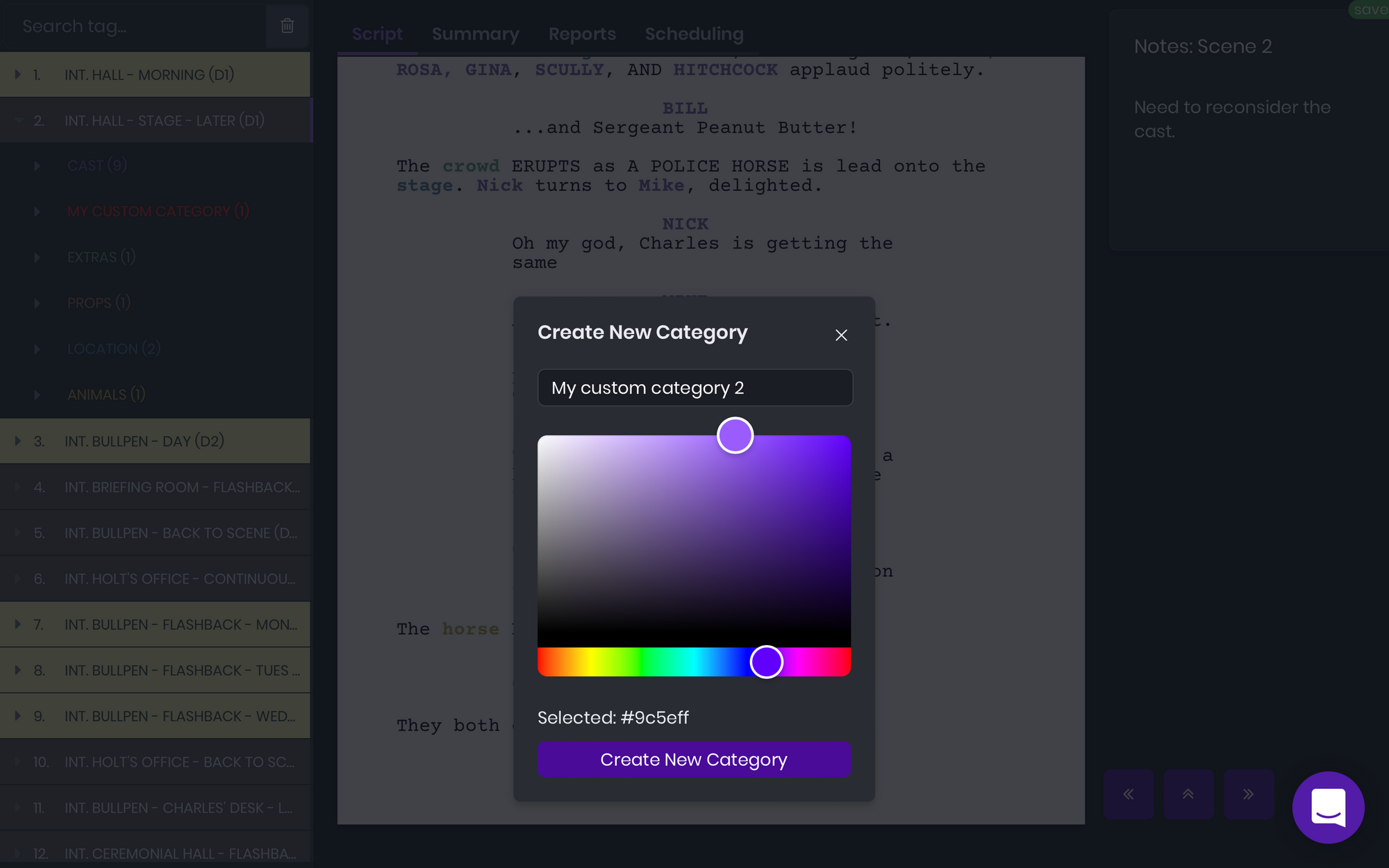
As we have already found out, the line producer has to think thoroughly about every aspect of the shoot. Related to this is the specificity of constantly analyzing and evaluating, for example, the budget of a picture: you constantly have to double check to see if the team can afford certain equipment, location, or logistical features. How nice it would be to have a tool that would bring together your results in a handy table... Filmustage system is smart enough to automatically give you a breakdown summary, according to which the producer can make a preliminary estimation in terms of the duration of a particular scene, the number of props and locations, how often they appear, in what scenes and much more. Remember, time is money, and the sooner the producer can convert the approximate shooting time into an actual budget, the more efficiently the resources will be allocated.
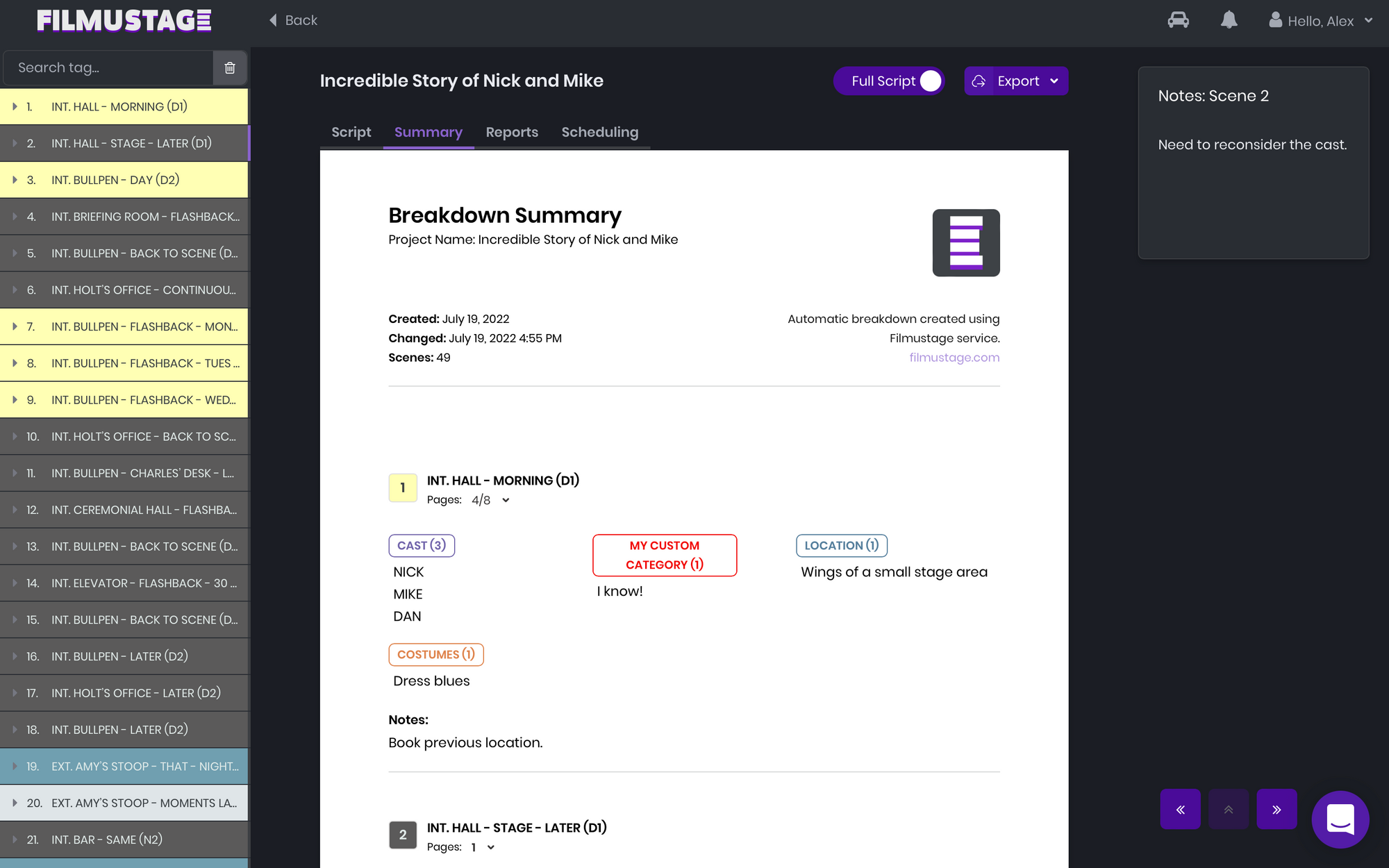
Based on a preliminary assessment of the script line producers create a draft of the shooting schedule: the number of days and locations, the number of characters, and the scenes in which they appear. Filmustage gives professionals the ability to work with breakdown and scheduling within the same platform, literally on adjacent tabs. Our scheduling feature allows you to define time intervals as well as specific locations (the service is directly synchronized with real maps and will help you to find the real location you need; moreover, the customization of locations extends right down to writing notes for each each of them, if you need to specify "rent for night time only", for example. The functionality of the scheduling tab doesn't end there: you can also freely sort scenes by number or location, or add auto-day breaks.
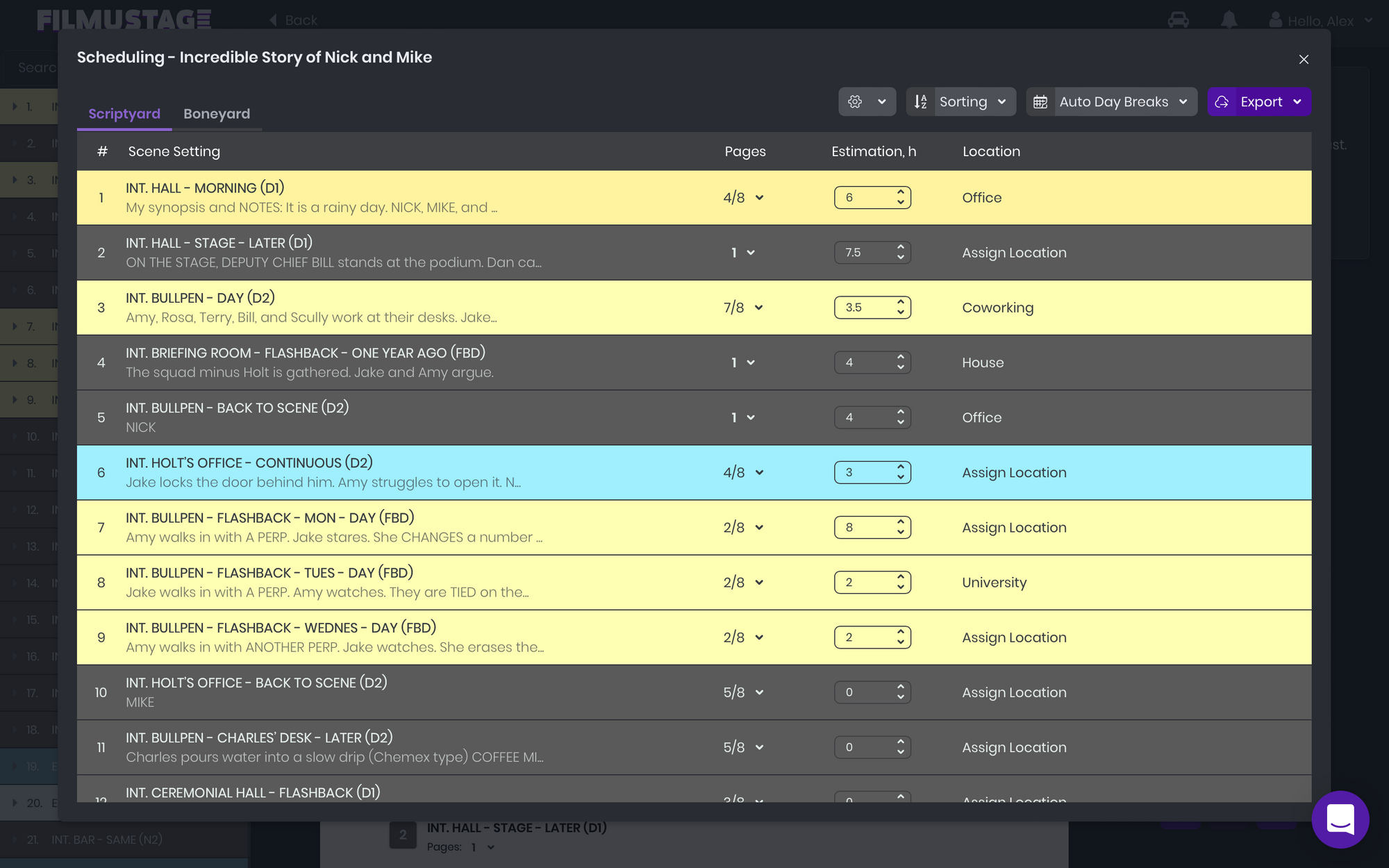
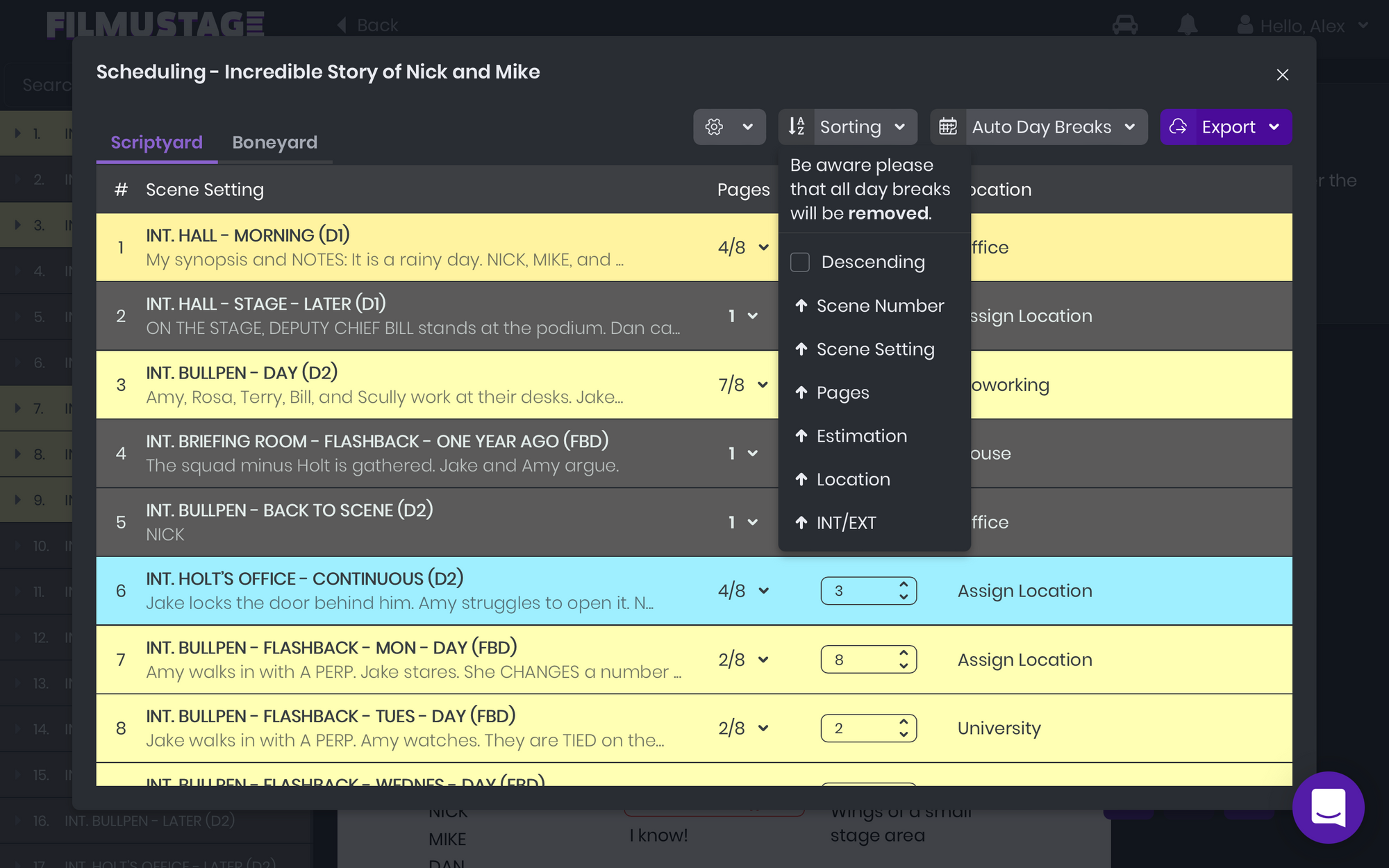
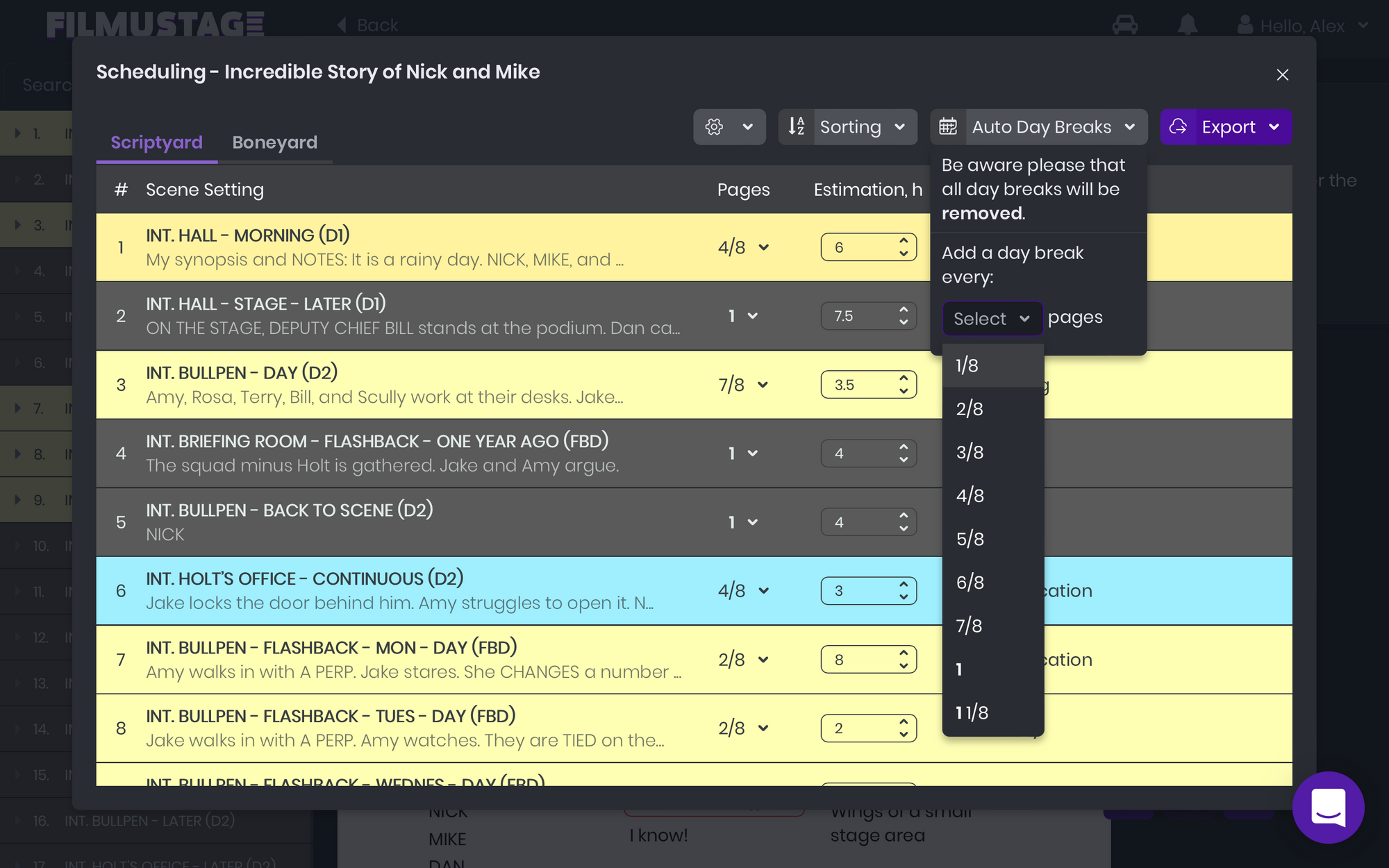
A third and not less important aspect that is useful for line producers is our new reports & references feature, where you can pick up the references for each category item (cast, props, location, costumes, vehicles, etc.) and sort the category items by tags, references, and scenes. The Visual References board feature provides the possibility to convert your thoughts into visual images and share them with the crew. You're free to attach a reference to each and every tag in your breakdown by choosing pictures from the asset stores, image stocks, or by uploading your own.
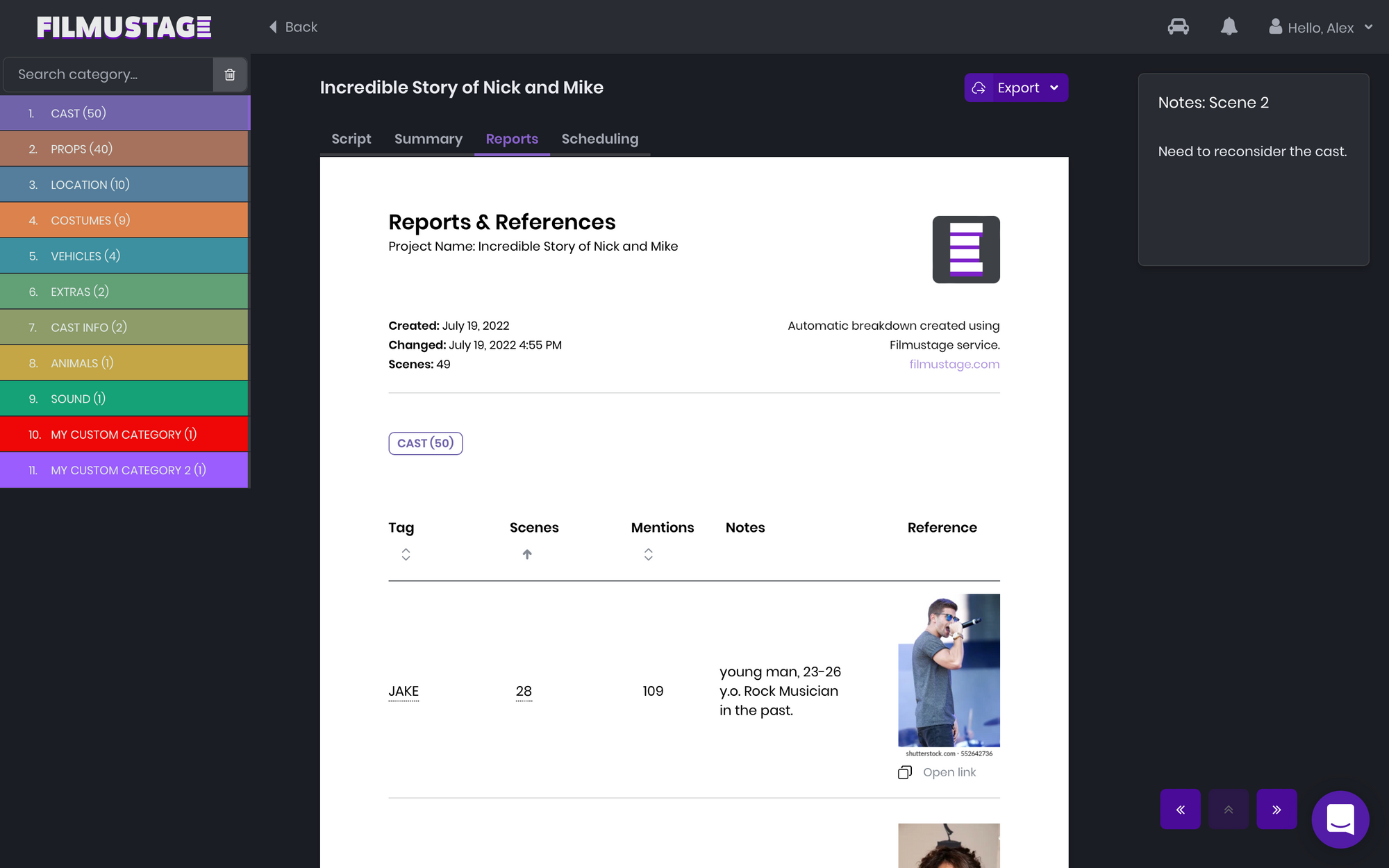
While Filmustage provides a platform that integrates many features of the platform, we understand that delegation is important to producers, so absolutely every step of the way you can instantly export the result of your breakdown, summary, or scheduling into spreadsheets, pdf documents, and even industry-standard software like Movie Magic Scheduling.
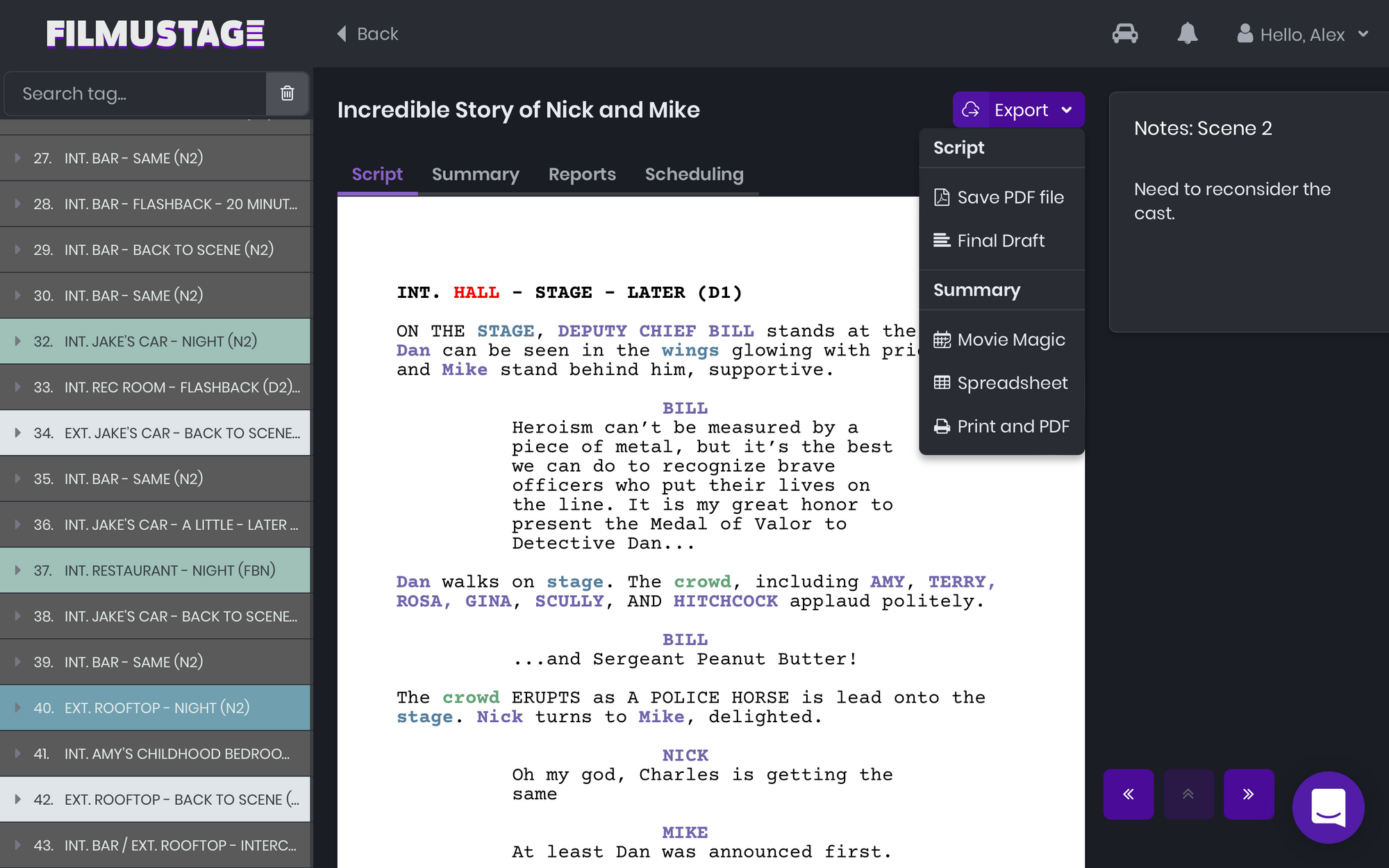
Thus, Filmustage represents a technological and highly effective solution for line producers that encompasses all the functionality for professional script processing: by combining the main processes of processing the script, we do not seek to replace the man, but to create a versatile tool, an intelligent and dedicated assistant who will help smooth the problematic corners in the work of line producers. Let's work together to create masterpieces like Apocalypse Now, without turning the filmmaking process into a real apocalypse.
See you on the pages of your script. Love, Filmustage.
From Breakdown to Budget in Clicks
Save time, cut costs, and let Filmustage’s AI handle the heavy lifting — all in a single day.